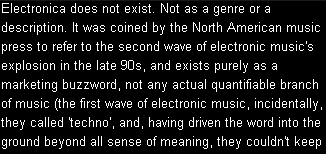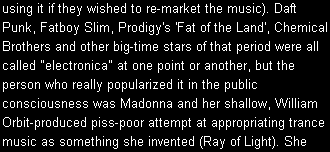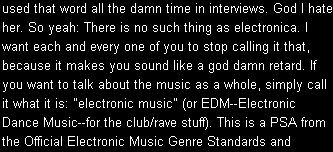View current page
...more recent posts
This song was popular in 1972 (at least on FM, "underground" radio--I was thinking it was Cheech and Chong but it was David Peel). It's all this page has to contribute by way of commenting on what is surely the Most Momentous News Story of Our Age, the passing of you know who:
The Pope Smokes Dope
David Peel and The Lower East Side
Chorus:
The pope smokes dope, God gave him the grass
The pope smokes dope, he likes to smoke in mass
The pope smokes dope, he's a groovy head
The pope smokes dope, the pope smokes dope
(oh yeah! 3x)
*
God is high on mescaline, Satan's high on smack
Popes in Rome get stoned on grass, Jesus freaks are back
Jesus Christ a super-hippie never shoot up junk
Popes in Rome get stoned alone, priests, in church get drunk
(Chorus)
Now Jack 'n' Jill went up the hill, to fetch a pail of water
Jill forgot to take her pill, now she's got a daughter
Taking pills is not a joke for a groovy Pope
Birth control can be a toke of marijuana smoke
(Chorus)
The pope is getting higher (re: higher! higher! - 4x)
(Chorus)
Cha! Cha! Cha!
Two interesting discussions of electronic music:
Kim Cascone on glitch music
Kelefa Sanneh vs Ben Neill on Moby [via NEWSgrist]
Both talk about music as "post-" something--Cascone uses the term "post-digital" and Sanneh/Neill hash out the meaning of Francis Fukuyama's "end of history" in the pop music context. Also, both use the dreaded term "electronica." Yes, it's just shorthand but it still violates a major tenet of Ishkur's Guide (now in version 2.5!):
This quote from Neill is especially good:
...um, Classifications Consortium.
With design superseding art, art appropriates the commercial because otherwise it feels obsolete, and art changes from a product industry to a service industry. Dematerializing, if you will. Is that bad? Is that why we have “the end of music”? I think it’s more because in today’s sensational story-driven world, how can something as mental as “Music” (especially instrumental music, which is nearly impossible to write about and therefore to sell) compete with gang wars between rappers and Michael Jackson’s sex scandals?He's defending Moby as a symptom of something good that almost happened in pop music in the '90s (anonymity, decentralization, no more friggin rock stars). Sanneh is somewhat knowledgeable (but snide) about the "paradigm shift" electronic dance music almost pulled off back then, but is still attached to the "great man" view of history--and the paradigm of newspapers needing stories on said friggin rock stars--and thus gives Moby disproportionate credit (on the up-side of his career) and blame (on the down) as a "shifter."
"hiphop_guitar (fragment)" [mp3 removed]
"free_alpha" [mp3 removed]
“darkest_nerk_scanner” [mp3 removed]
Starting tomorrow, I'll be having a guest blogger. It's Bill Schwarz. That will be taking up most of his time, so I'll be guest blogging over at Schwarz. Be sure to let us know if you can tell the difference.
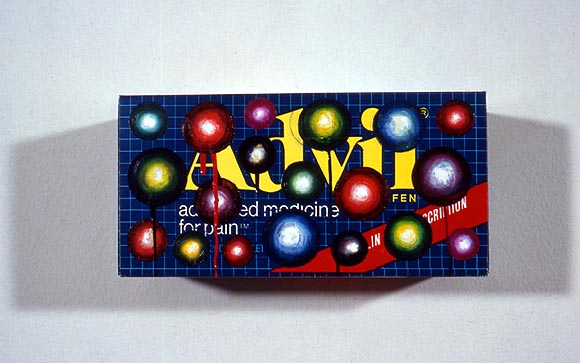
Advil Box, 1994, acrylic on promotional display box, 16.5 x 8 x 8.5 inches
"Drum Thing" [mp3 removed]
"Mutated Drums" [mp3 removed]
"Drum Thing" is played with six sampled drumkits--sort of like chamber music with the same beat; "Mutated Drums" is another pattern played live through an analog filter--more of a "knob workout," as we say.
Here in New York the fall of the twin towers etched a pretty deep scar in the civic consciousness. Everyone was affected by it in some way, and people still have a hard time talking about it. Unlike the millions around the U.S. who goggled at the event over and over on TV, in this city it was a lived thing. Ironically it was those TV-gogglers, with no direct experience of the tragedy, who bayed most loudly for war. People here just wanted Bush to stop stirring the pot. (Not everyone, but hundreds of thousands turned out for demonstration after demonstration.) Below, images of New York artist Matt Freedman's work at vertexList, from a two person show with Jude Tallichet. Shades of Richard Dreyfuss and the Devil's Tower in Close Encounters of the Third Kind: the damn things get to you.
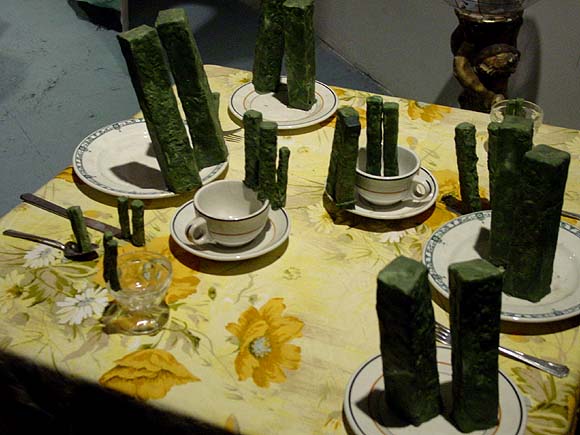


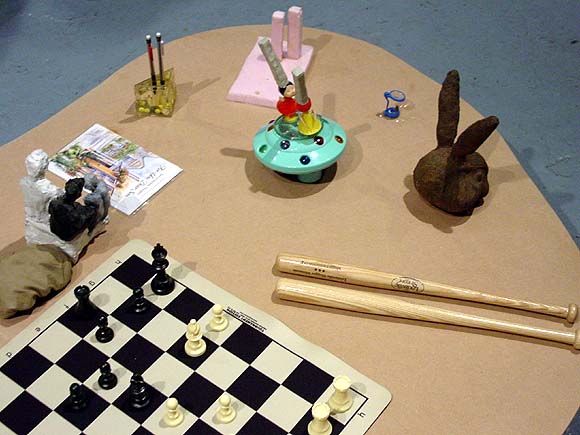
Intellectual property law might have gone in a very different direction if not for Judge Sol Kramer and his "Lighten the Fuck Up" rule. One shudders to think what the world would be like for creative people if this crusty New York jurist hadn't been sitting in the Southern District federal court, where a succession of copyright cases inevitably wound up in the '80s and early '90s. That rare lawyer who actually understood art and music, Judge Kramer created an intimidating series of precedents that shaped the course of U.S. artistic history. It's amusing to think back now at the judge's use of salty language in the courtroom as plaintiff after plaintiff made its case and came away disappointed. Of course, the written opinions that followed were exquisitely reasoned and delved deeply into the minutiae of the respective artworks, guided by the judge's strong and principled belief that, while these matters had to be taken on a case by case basis, creativity ultimately had to be protected from the drag of frivolous lawsuits. The following are some his jabs from the bench:
"Your honor, my clients Messrs. Kaylan and Volman, aka the Turtles, have been severely damaged by the indiscriminate sampling of their world famous string intro to the 60s hit 'You Showed Me,' in De La Soul's 'Live Transmission from Mars.'"
"Oh, lighten the fuck up. 'Live Transmission' is a one-off novelty song, hell, it's not even a song, it's a little ambient piece. Get out of my courtroom."
"Representing myself, your honor, I am appalled that Jeff Koons took my image 'String of Puppies' and made a sculpture out of it and I seek a milllion dollars in damages."
"Oh, lighten the fuck up. His work is in the museum and yours is in the museum shop. Not the same market at all. He did you a favor publicizing that sentimental fluff, you should thank him."
"'My Sweet Lord' uses the exact same melody as 'He's So Fine.'"
"Yeah, but everything else about it is different. Lighten the fuck up."
[More "lighten the fuck up" rulings will be added as I think of them. In reality, every one of these trivial nuisance suits was treated as a matter of grave importance by the courts and contributed to the awful muck that is copyright law today. The judge's description of the "String of Puppies" photo was softened even though I think the photographer was an ass for suing. I mean, he made an ordinarily uplifting photo and Koons ridiculed it all the way to the bank--just deal, sometimes things happen when you put sickly sweet crap out there in the world. --tm]

